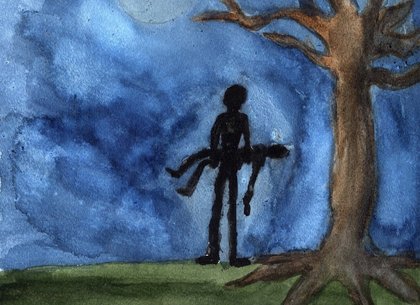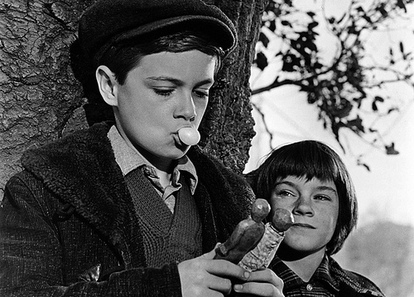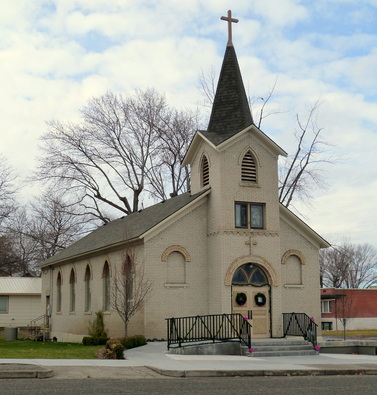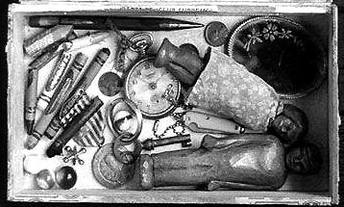After the whole Halloween pageant fiasco, even though Scout and Jem are harshly attacked by Bob Ewell, Scout is not afraid one bit. The only thing that she is really concerned about is if her brother is okay or not. She repeatedly asks the doctor if Jem is dead. Another thing she becomes concerned about is Boo Radley. After she spots him for the first time, she questions why her brother and herself only took the presents from Boo, and never gave him anything back. She feels really guilty about it, especially after she learns that he saved her and Jem, and that he carried Jem home. After she walks with Boo to his house she stands on his porch and looks around. She looks at her neighborhood very closely. I believe that Harper Lee chose to end the book with Scout looking at the town from this vantage point because she sees the neighborhood as Boo has seen it for this entire time.
Jem grows up a lot during the course of the story. He shows growth in several parts of the story. He wanted to spend less and less time with his sister and he always wanted to play with just Dill, not Scout. Also, he begins to become more interested in sports, particularly football, and he starts reading the newspaper. A significant example is also when he becomes compassionate towards Mrs. Dubose when he finds out about her death. Perhaps the most important example is when he sold out Dill to Atticus when he found out that Dill ran
away. At first he didn't seem like he wanted to, but he thought that Dill's family should know that they found him. Throughout the entire book, Jem shows that he is "coming of age" and slowly maturing. BLOG #10: What does Atticus mean when he says in Chapter 22, it “seems that only children weep?”10/14/2013 In Chapter 22, Atticus states that it "seems that only children weep." I believe he means that usually only children have a big enough heart to care for people. He says this after Jem cries because of the unfairness of the trial. Jem, as well as everyone else, know that Tom Robinson is innocent. Yet, Jem appears to be one of the only people who is saddened by this injustice. Atticus probably believes that people forget their morals and values as they get older.
Personally, I like Dolphus Raymond's behavior and choices. He believes that everyone is equal and has no problem with neither black or white people. Also, he prefers to spend his time with African-Americans even though his fellow white friends are judging him. He even has a few mixed children. The town thinks that he is a drunk man, but he really is sober and the drink he is actually drinking is just soda. He just lets the town believe the rumors because he thinks it makes everything easier to "understand" to everyone else. Everyone else figures that he is only married to a black women and has mixed kids because he is a drunk, but he is actually quite happy with his family and his decisions.
The Ewell Family's geographical location greatly contributes to their "place" in Maycomb. Their tiny house is located near the town dumb. You could interpret that as a hint that they are considered trash to the other town people who aren't in their situation. The theme that is linked to this concept is "Social Prejudice". "Social Prejudice" explains this concept because the other citizens of Maycomb treat the Ewells like rather like dirt or garbage, just because they don't have any money. Money doesn't necessarily define a person, but the majority of Maycomb treats it like it does. They are laughed at and ignored only because of their money situation. Maycomb as a whole is prejudice against the poor.
Scout is somehow able to stop the men at the jail from lynching Tom Robinson in Chapter 15. The theme that links to this event is "Moral Courage". Mr. Walter Cunningham shows moral courage when he's at the jail. When he is about to go and lynch Tom with his mob friends, Atticus's kids show up and he is knocked back into his senses. Scout eagerly talks to him, and even mentions his son, who goes to school with her. I believe that she reminded him of his own son, because his morals kicked in, and he left and convinced the others to leave and not come back. Walter could have gone in right then and lynched Tom, but Scout's innocence made him wary and overall stopped the situation before it could happen. He had the courage to do what he thought was right, even when he previously thought something else was the right thing to do.
Scout was deeply upset by the way that both the African-American and white churches regarded women. The reason that she was so upset was because both churches see women as "the enemy". According to the African-American church specifically, women were worse than bootleggers. Both churches also preached an "Impurity of Women" doctrine. Scout said the only difference she noticed was that Reverend Sykes at the African-American church used his pulpit more freely to express his views.
In Chapter 11, Atticus says this statement that he believes defines real courage. Atticus is right on the mark when he says this. He backs up this statement with his actions. He know before he starts the trial that most people won't take it kindly that he is defending a black man accused of raping a white woman. Although he knows this, he defends that man (Tom Robinson) anyway. Mrs. Dubose and her actions greatly support this statement. Mrs. Dubose insults Atticus badly and even lowers herself down to insult and harass his kids. Atticus knew he would be insulted and threatened by people like her, but he stuck to his moral compass and did his job anyway.
I believe there are two mockingbirds in To Kill a Mockingbird. Boo Radley and Tom Robinson. Before I explain how they are mockingbirds, I must first explain how it is a sin to kill a mockingbird. Mockingbirds are creatures that do no harm to anyone else, they only provide beautiful music to everyone. If you kill one, you are killing an innocent creature. Boo is a mockingbird because he is an innocent person who is just trying to make connections with people and be free. Tom is a mockingbird because he is an innocent man being blamed for a crime he didn't commit.
I believe that there are three reasons that Boo makes connections with the children. First, after being locked up for so long, he sees them perhaps as friends. Also, he probably sees his childhood self in him and he grows affectionate for them and he wants them to be happy. The last reason is that he probably knows that they are scared of him and he wants them to connect the puzzle pieces that he is not a bad person, just a person that bad things have happened to. Boo does his best to make connections when he leaves presents in the tree (such as the two dolls) until the hole got filled with cement. Also, when he puts a blanket around Scout's shoulders while she watches Miss Maudie's house burn. Boo Radley has the very best intentions at heart when he tries to reach out to the kids.
|










 RSS Feed
RSS Feed